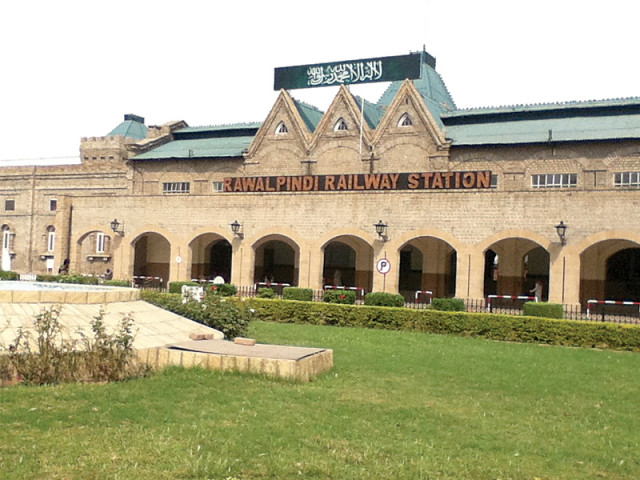Military rule legacies: Enter the boots, exit books
Before Partition, railway stations housed libraries and recreational clubs. Most have been converted into thanas.

The club and library at the Rawalpindi railway stations was converted into a police station during Gen Javed Ashraf Qazi’s stint as railways minister. PHOTO: AZAM KHAN/EXPRESS
Against this backdrop, the demolishment of libraries and recreational areas established during the British era at railway stations, more often than not to turn them into police stations, is one such example.
According to records, libraries have been shut down in the name of sanctity, sensitivity and national interest, to give way to more thanas. Consequently, even during Gen Pervez Musharraf’s ‘moderate’ military rule, countless precious books were discarded.
Tracks to Rawalpindi
The railway station in Rawalpindi, a garrison city, was built in the 1880s by the government of British India to facilitate trade.
According to Mian Naveed, the welfare secretary at this station, it was during Gen Javed Ashraf Qazi’s tenure that the library and the club (which even housed a bar) were turned into a police station. Earlier, all kinds of facilities, including indoor games, were provided inside but now everything in the possession of the ‘wardi walas’.

The club and library at the Rawalpindi railway stations was converted into a police station during Gen Javed Ashraf Qazi’s stint as railways minister. PHOTO: AZAM KHAN/EXPRESS
“Before Partition, passengers and staff alike would have a wonderful leisure time,” recounts Naveed. “Afterwards, libraries only existed at the divisional level. Now, just one or two libraries exist across the country, and those too are in a shambles.”
A retired official recalls further details about the Qazi’s era.
“One day, the minister for railways called us and ordered us to immediately throw out all books in the club which was then called the Railway Institute,” he remembers. “We had to throw all the sports accessories out too. The very next day, there came an order to set up a police station there.”
Thousands of important books were dumped in the verandas at railway stations. Countless of them were stolen.
Mushtaq Ahmed, an aged librarian at Rawalpindi station agrees.
“There is no audit and no one wants to take care of our national assets,” he murmured quietly. “Interestingly, five rupees are still deducted from the salaries of lower staff as ‘library fund’ every month.”
Volumes wasted
Wizened and retired, Ahmed holds preservation of libraries close to his heart. He has managed to get a small room at the station. In that room, he attempts to preserve some of the discarded books. He works as a volunteer librarian.
“Some of the books thrown out of the library still remain with us. Many have been stolen. There is no record of stolen books,” says Ahmed. “About 45,000 books are still with us, some of them are extremely rare.”
The librarian expects that one day there will be an order to shift this small library elsewhere but when he does not know.
“The library serves a purpose. Retired employees visit here when they come for pension or other matters. Eight to ten people can easily sit here, and read books and newspapers,” he states proudly.
“We keep the library open twice a day, from 9am to 11am and, from 4:30pm to 6:30pm,” he said with a modest smile.
Published in The Express Tribune, October 21st, 2013.



















COMMENTS
Comments are moderated and generally will be posted if they are on-topic and not abusive.
For more information, please see our Comments FAQ